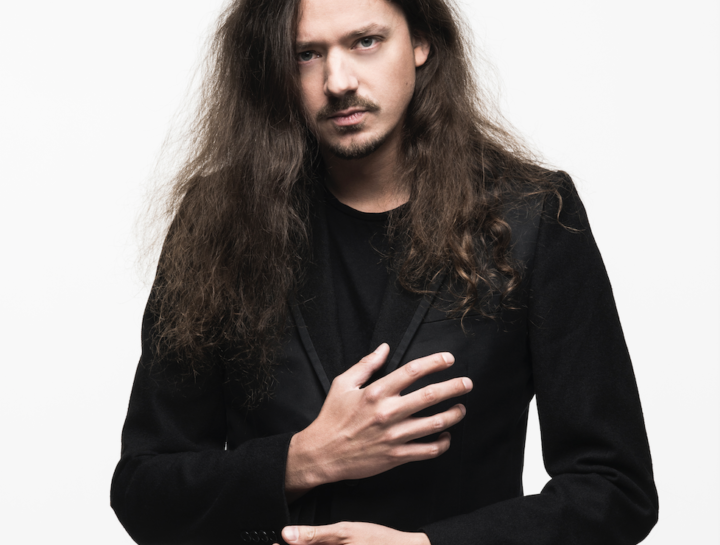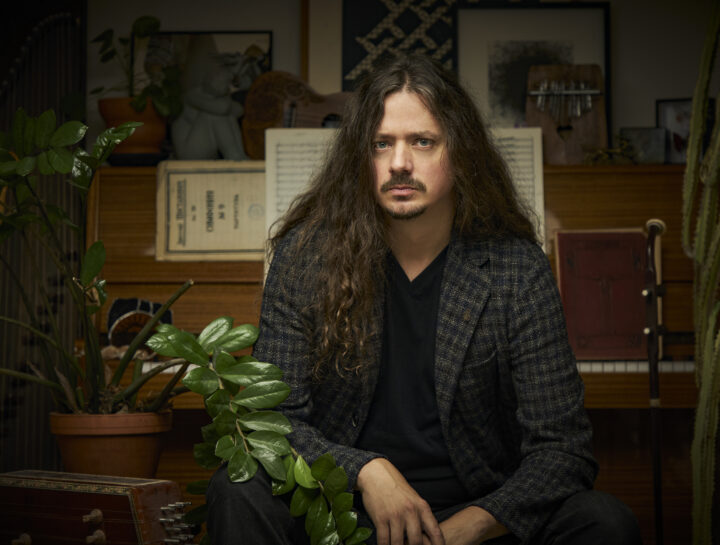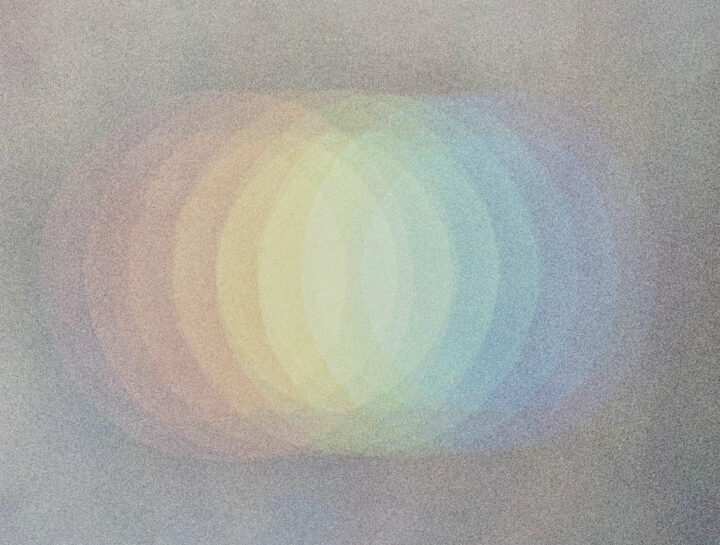Revered Finnish composer and musician Lauri Porra has captured this dramatic joining of science and philosophy in the emotional score of ‘Requiem Mundi (Matter Is Not The Only Thing That Exists)’. It is hushed chorale scored for strings, which builds through a swelling orchestral climax to culminate in a state of deep love and gratitude.
The accompanying video captures vast scenes from the depths of space and across planet Earth which depict the beautiful and dramatic circle of life. This is interspersed with footage of the piece being performed live by Finland’s acclaimed Vantaa Orchestra, conducted by Dalia Stasevska at the Helsinki Musiikkitalo as part of Helsinki Festival. Watch the video here.
‘Requiem Mundi’ is taken from the remarkable new album Matter And Time, out April 19thvia Platoon and available to pre-order here. The composition is a musical love letter to the universe, using the words of the celebrated astronomer and writer Esko Valtaoja, as spoken by the actor, author and broadcaster Stephen Fry. The music is performed by the Vantaa Orchestra, conducted by Dalia Stasevska, with vocals from Helsinki-based singer Ringa Manner, and lyrical contributions from Paula Vesala.
Scored for narrator, large orchestra, choir, electric ensemble and vocal soloist, Matter And Time finds Porra bringing together an array of musical influences to create a hugely ambitious work, in both scope and sound. At times reminiscent of the work of Vangelis, Jean Michel Jarre, John Williams or Hans Zimmer, Matter And Time creates a sense of narrative and atmosphere as if Jeff Wayne’s War Of The Worlds had in fact been narrated by Stephen Fry and based around a scientific treatise on the nature of the cosmos instead of an alien invasion.
Woven through this cinematic score are moments that bring to mind the likes of Björk, Sigur Rós, Dead Can Dance and even Kate Bush at her most cosmic on the track ‘Consciousness’. Searing guitar solos pay testament to Porra’s rock credentials as he takes us on a voyage from the very beginnings of the universe, the birth of the carbon atom and the first murmurings of life on earth.
Over its 40 minutes across 10 tracks, we travel through the lifespan of our solar system and 100s of billions of years onward as the universe starts to die. What survives us is the love we have for one another—spelt out in binary ones and zeros. Science and human experience in perfect harmony.
Originally composed in 2018, Matter And Time was commissioned and premiered by Finland’s Vantaa Orchestra, and draws on many of Porra’s musical influences, from rock and pop to cinema, and the great orchestral scores of the 20th century. In 2024 it is now released in recorded form for the very first time.
In addition to being a hugely respected orchestral composer, and a direct descendent of the legendary composer Sibelius, Lauri Porra is well-known to rock and metal audiences around the world as the bass-player in the ‘power-metal’ band Stratovarius, with whom he has recorded six albums and performed concerts in over 50 countries.
“I always think of music as a toolbox,” says Porra of his diverse musical background in classical, rock, metal, jazz and film music. “People create sound to evoke a reaction – that is the basis of music. It doesn’t change because of its style or purpose, or because of where the music is made. For me, all music is the same.”
MATTER AND TIME TRACK LISITING
- Beginning
- Attraction
- Energy
- Evolution
- Consciousness
- The End
- Fall Of Man
- Requiem Mundi (Matter Is Not The Only Thing That Exists)
- Epilogue
- Future
Matter And Time opens at the dawn of time itself with ‘Beginning’. “Here we are. Here is life, here is the universe. Welcome.” Stephen Fry’s amiably authoritative voice sets us on our existential path while all around, orchestral sounds emerge like primordial life, coalescing, rising as if from nothing. Listen to ‘Beginning’ here.
Elements start to form in ‘Attraction’, where breathy vocals from singer Ringa Manner draw parallels between human interaction and the movements of atoms and particles. We move seamlessly to ‘Energy’, with thrumming strings, drums and vocal melody, again sung by Ringa Manner, all jostling and colliding in different tempos and rhythms, mirroring the fluctuation of time throughout the universe.
‘Evolution’ takes us on a dizzying ride through billions of years from the birth of stars and planets to the beginnings of biological life, and onwards to the ascent of man, “a child of the stars, a grandchild of the universe”.
Porra’s music follows the trajectory of Fry’s powerful narration, molecules dividing and evolving to the sound of skittering woodwind and digital chatterings. And as man looks towards the stars and announces to the universe, “I am”, Porra marks this seminal moment with a hypnotic, anthemic rock motif while fantastical film music accompanies the “dance of natural selection” in what Porra calls his “ballet scene”. As man conquers space, the movement ends in a glorious union of rock and orchestral music.
A lusciously orchestrated pop song frames ‘Consciousness’, exploring the idea of the awakening mind, the realisation of self and the search for meaning. We return to Fry’s narration with ‘The End’, as the sun dies after “a thousand billion mornings” and the story of life on earth comes to a violent close.
“Perhaps,” says Fry, “matter is not the only thing that exists.” ‘Fall Of Man’ heralds a cinematic soundscape of organ, full orchestra, percussion and wordless vocals, the music descending into cacophony and chaos, on a path to self-destruction. And ‘Requiem Mundi’ rises from the ashes, a hushed chorale scored for strings, and a lone heartbeat and culminates in a state of deep love and gratitude.
For the ‘Epilogue’, Fry theorises on the future of humankind: “Our life continues in our children and in our deeds, the life of the cosmos continues in us. How high will the fifth stage of evolution reach? Now we transform the Earth; perhaps in the far future we will transform the Universe.” But what is our true legacy? In ‘Future’, a choir intones in binary, the zeros and ones spelling out “rakkaus”, the Finnish word for “love”, wrapped up in orchestral and electronic music of ever increasing, driving energy – and pure joy. “Most of our life is a celebration of love,” says Porra. “and it’s love that gives us meaning and purpose.”
Porra’s inspirations for his ambitious work were church mass settings, composed centuries ago when the creation story was the accepted explanation of life on earth, and everything was predestined by a supreme deity. “When you listen to music by Bach, you can sense this immense gratitude and love towards God,” says Porra. “I was interested in this, the depth of love and this sacredness, but I wanted my piece to be a testament of love and gratefulness towards the universe.”
Porra embarked on a quest to discover whether a person could love the universe with the same intensity of devotion. “Instead of a religious text,” he says, “I started to wonder whether I could use one based on scientific ideas.”



